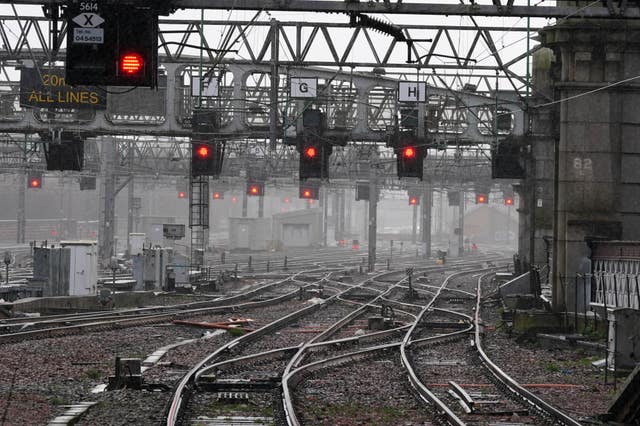
Ian Payne 4am - 7am
21 June 2022, 09:34

ScotRail was running services on just five routes as the RMT union commenced industrial action across the UK.
Significant disruption across Scotland’s rail network has begun as workers at Network Rail take strike action this week.
Workers responsible for train lines and infrastructure across the UK walked out on Tuesday – with further action on Thursday and Saturday – as ScotRail was able to run services on just five routes on these days.
The rail operator will run two trains per hour on the Edinburgh to Glasgow via Falkirk High line, the Edinburgh-Bathgate line, the Glasgow to Hamilton/Larkhall line and the Glasgow to Lanark line.
One train an hour will run on the Edinburgh to Glasgow via Shotts service.

Services on the five lines will only operate between 7.30am and 6.30pm on the dates affected.
Passengers were warned last week by ScotRail to only travel on the limited services “if they really need to”.
Major disruption is expected across the UK as the RMT union takes industrial action over a pay dispute with Network Rail and some Department of Transport rail operating companies.
It is understood that staff at ScotRail will be expected to attend their usual place of work on the days strike action is planned.
The operator said employees will be “deployed for other duties”, including training and staff briefings, where appropriate.

Gordon Martin, RMT regional organiser for Scotland, said the strike is the last resort for members, and said the union is looking for a “meaningful offer” to resolve the dispute.
He told BBC Radio Scotland’s Good Morning Scotland programme: “This is not the first option, this is the last resort for our members.
“It’s a fight that we didn’t want, this is a defensive action by this trade union, but it will be until we get a reasonable settlement and the members have made that abundantly clear to me and others.
“This is a defensive measure by our members in defence of their jobs, their terms and conditions and, I would argue, the safety of the rail industry.”
Scottish Conservative transport spokesman Graham Simpson said the RMT is “militant” and needs to get back around the negotiating table.

He told the Good Morning Scotland programme: “What the RMT has to do is stop being so militant, and get back around the table and get the country moving again.”
Mr Simpson was asked why he called for Scottish Transport Minister Jenny Gilruth to get involved in the dispute between Aslef and ScotRail, but not her UK counterpart, Grant Shapps.
He said: “It’s different because it’s not just Network Rail.
“As I said earlier, there are 13 train companies involved. So it’s very, very complicated.”
Nick King, a spokesman for Network Rail in Scotland, said a modernised railway could improve its pay offer for staff by passing on savings.
He told Good Morning Scotland the strike could be resolved if the union moved its position on working practices and any reduction in staff would take place on a voluntary basis.
Mr King said: “The dispute is not going to be solved through strike action. It’s not going to be solved on a picket line.
“It’s going to be solved by negotiations in a room, and negotiations have been taking place for 18 months now on this issue.
“We feel that there are clear ways in which we could modernise and change the way we currently operate and that would then enable us to free up savings that we could then use to fund a pay rise.”
Experts in the retail sector have issued warnings over the potential negative impact the limited services will have on Scotland’s shopper footfall figures, which were down by 16% on pre-pandemic levels in May.
David Lonsdale, director of the Scottish Retail Consortium, said: “Retailers in Scotland’s city centres were clobbered by the exodus of commuters during the pandemic.
“Even now, several months on from the end of restrictions and store visits are still shy of pre-Covid levels, with Scotland rooted to the bottom of the UK league table for shopper footfall last month.
“Many stores are only just beginning to emerge from the long and destabilising impact of the pandemic, and further train disruption could deter shoppers and derail retail’s recovery.”